

IB Guide: I&S. Overview An extended essay (EE) in global politics gives students an opportunity to undertake an in-depth analysis of a significant, contemporary global political issue.
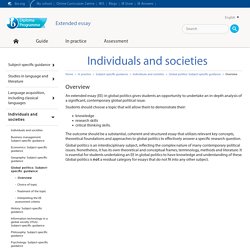
Students should choose a topic that will allow them to demonstrate their: knowledge research skills critical thinking skills. The outcome should be a substantial, coherent and structured essay that utilizes relevant key concepts, theoretical foundations and approaches to global politics to effectively answer a specific research question. IB Guide: History. Interpreting the EE assessment criteria Criterion A: Focus and method (Strands: Topic, Research question, Methodology) Students must choose a topic from the human past that is of a meaningful nature.
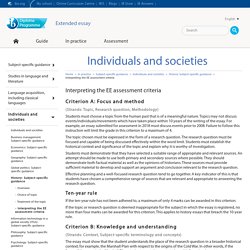
Topics may not discuss events/individuals/movements which have taken place within 10 years of the writing of the essay. IB Guide: Global Politics. Interpreting the EE assessment criteria Criterion A: Focus and method (Strands: Topic, Research question, Methodology) Students must choose a topic that deals with a contemporary global political issue.
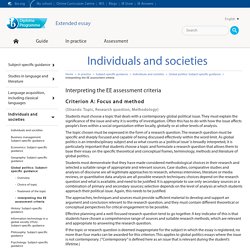
They must explain the significance of the issue and why it is worthy of investigation. Often this has to do with how the issue affects people’s lives within a social organization either locally, globally or at other levels of analysis. IB Guide: Geography. Interpreting the EE assessment criteria Criterion A: Focus and method (Strands: Topic, Research question, Methodology)
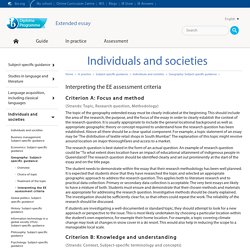
IB Guide: Economics. Interpreting the EE assessment criteria Criterion A: Focus and method (Strands: Topic, Research question, Methodology) The topic and context of the economics extended essay must be clearly established at the beginning of the essay.
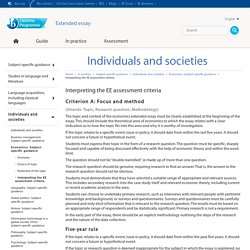
IB Guide: Business Management. Interpreting the EE assessment criteria Criterion A: Focus and method (Strands: Topic, Research question, Methodology) The EE title promotes the application of the higher order skills of analysis, evaluation and synthesis, rather than encouraging a descriptive essay.
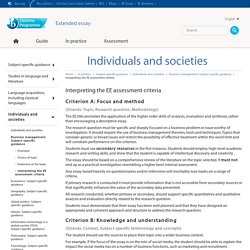
The research question must be specific and sharply focused on a business problem or issue worthy of investigation. EE History Assessment Rubric. EE Research proposal History. History EE Example 1. History EE Example 2. EE History example 3. EE History Example 4. EE History example 5. EE History example 6. EE History example 7. EE History example 8. EE Research proposal Geography. Geography: Choice of topic. Geography: Treatment of the topic. Students should establish the geographic and theoretical context for their research question early in the essay.
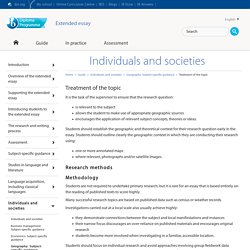
Students should outline clearly the geographic context in which they are conducting their research using: Research methods Methodology Students are not required to undertake primary research, but it is rare for an essay that is based entirely on the reading of published texts to score highly. Many successful research topics are based on published data such as census or weather records. Investigations carried out at a local scale also usually achieve highly: they demonstrate connections between the subject and local manifestations and instances their narrow focus discourages an over-reliance on published materials and encourages original research students become more involved when investigating in a familiar, accessible location.
Students should focus on individual research and avoid approaches involving group fieldwork data collection. Resources Illustrations and maps Maps. Geography: Interpreting the assessment criteria. Geography subject-specific guidance (ISS) EE Example Geo Urban Development. Geography EE Example One part I. Geography EE Example One part II. Geography EE Example two. ISS17041110351 (1) ISS17041110350. ISS17041110340. ISS17041110321. ISS17041110320. ISS17041110300. EE Geo Example poverty 2. EE Geo example urban development 2. IB Business Subject Report 2018. BM Presentation 2021. EE Research proposal Business. Business management: Interpreting the assessment criteria. Interpreting the EE assessment criteria Criterion A: Focus and method (Strands: Topic, Research question, Methodology) The EE title is best stated in the form of a question that promotes the application of the higher order skills of analysis, evaluation and synthesis, rather than encouraging a descriptive essay.
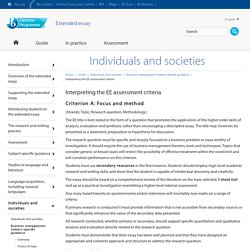
The title may, however, be presented as a statement, proposition or hypothesis for discussion. The research question must be specific and sharply focused on a business problem or issue worthy of investigation. Students must use secondary resources in the first instance. The essay should be based on a comprehensive review of the literature on the topic selected. Any essay based heavily on questionnaires and/or interviews will inevitably lose marks on a range of criteria. If primary research is conducted it must provide information that is not accessible from secondary sources or that significantly enhances the value of the secondary data presented.
Criterion C: Critical thinking. Business management: Treatment of the topic. Treatment of the topic Sources Students’ research should be broad and detailed, using a range of sources.
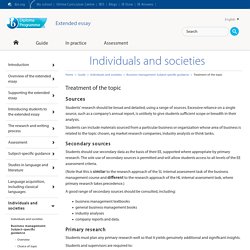
Excessive reliance on a single source, such as a company’s annual report, is unlikely to give students sufficient scope or breadth in their analysis. Students can include materials sourced from a particular business or organization whose area of business is related to the topic chosen, eg market research companies, industry analysts or think tanks. Secondary sources Students should use secondary data as the basis of their EE, supported where appropriate by primary research. (Note that this is similar to the research approach of the SL internal assessment task of the business management course and different to the research approach of the HL internal assessment task, where primary research takes precedence.)
A good range of secondary sources should be consulted, including: business management textbooks general business management books industry analyses company reports and data. Business management: Choice of topic. Choice of topic Students can choose a topic they have encountered during their Diploma Programme business management course.
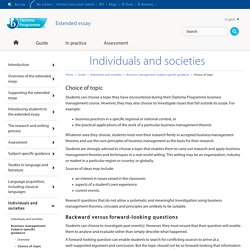
However, they may also choose to investigate issues that fall outside its scope. For example: business practices in a specific regional or national context, or the practical applications of the work of a particular business management theorist. Whatever area they choose, students must root their research firmly in accepted business management theories and use the core principles of business management as the basis for their research. EE2018BM5. EEBM22018. EEBM20184. EEBM20183. EEBM20182.
EEBM20181. Group 3 Research Proposal Global Politics. EE glopo exampleA en. EE glopo exampleB en. EE glopo exampleC en. EE glopo exampleD en. B GlobalPolitics ChinaDevelopment 2018.